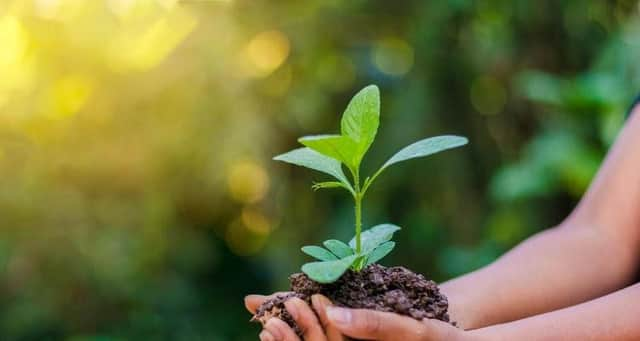How companies can help the ‘green recovery’ towards a sustainable post-Covid future


Scott Rodger and Rachael McCready of law firm Shepherd and Wedderburn believe so - because businesses and governments realise sustainability and resilience go hand-in-hand when shaping a post-virus future. As part of the next EU budget, the European Commission has proposed a €750 billion Covid-19 stimulus package with green recovery at its heart.
“It was great to see green recovery established as one of five new UK Government groups to support business beyond the crisis,” says McCready, a solicitor in Shepherd and Wedderburn’s sector-leading clean energy team.
“However, we need the green recovery to traverse and be an integral part of all the other groups, to act as a catalyst across the whole economy, including corporates, SMEs - and society in that process. Everyone has a part to play, and businesses need to focus on the significant contribution they can make. It is fundamental to creating a sustainable future.”
Scott Rodger, also a solicitor in the firm’s clean energy team, accepts many businesses are still grappling with the impacts of Covid-19, but says they must seize opportunities to move to more sustainable models - to use another buzz-phrase, to ‘Build Back Better’: “Businesses are understandably dealing with immediate priorities, but already their thinking is starting to shift to ‘what comes next’ and the green recovery provides a clear path to long-term sustainability.”
Incentives
McCready says emerging from the pandemic demands long-term strategic thinking to address climate change and deliver benefits for societies across the world. There is a role for governments, she says, in creating the right incentives to support green recovery, with some countries linking Covid-19 business support packages to promoting sustainability.
“A green recovery can target investment at forward-looking, innovative industries rather than legacy industries, moving our economy away from fossil fuels towards a future focused on achieving net zero,” says Rodger.
The immediate chance to highlight this agenda (with the UK targeting 2050 and Scotland 2045 to achieve net zero) was lost with the postponement of the COP26 climate change talks from November 2020 to 2021.
However, McCready thinks the delay won’t derail momentum and might actually deliver more meaningful outcomes when COP26 does happen: “It seems like we are at a turning-point, as clients reflect on their priorities and focus more on environmental, social and governance (ESG) factors which are central in measuring the sustainability and societal impact of business investment. Crucially, it is not just our clients in the energy sector who recognise the importance of these factors.”
Rodger says eye-watering estimates about what is needed to achieve net-zero targets (up to €575 billion Euros annually) could be off-putting, but the benefits are clear: “We will create new job opportunities, better places to live with less pollution, and more inclusive communities. We must ensure the positives are articulated.”
In terms of specific actions which could fuel the green recovery, Rodger suggests measures like retro-fitting office buildings currently unoccupied to improve energy efficiency. “There is an argument for an incentive regime to allow that to happen rapidly,” he says. McCready adds that says businesses are looking closely at lockdown work patterns and how the positives - more home-working and less business travel, and specifics like less printing and more ‘business’ being done virtually - can be captured as part of the new way of working going forward.
Bailouts
However, in seeking a green recovery, mistakes made during previous post-crisis economic recoveries must not be repeated, Rodger and McCready insist. Fatih Birol, executive director of the International Energy Agency, has warned bailout packages after the 2008 financial crisis led to the biggest rise in carbon emissions in 50 years.
“Governments cannot simply rehash the 2008 response. The focus cannot solely be on kick-starting the economy. There needs to be a clear focus on green recovery,” says McCready.
Rodger says that means avoiding blanket interventions that include support for carbon-intensive industries: “We need to look at big challenges on the energy side, like investing massively in transmission and distribution networks to support electrification of the economy, and large-scale storage to offset the intermittency of renewables. But we also need to look beyond the energy sector, and ensure all areas of the economy are on board. This is a positive environment to accelerate the shift towards green energy and a more sustainable society.”
McCready believes the broader climate will also help fuel green recovery: “We can see changes in people’s behaviour. People are shopping locally, making far fewer car journeys and thinking about what wasn’t sustainable about their routine before.
“Consumers and customers are demanding more sustainable approaches by businesses and this will intensify. An increasing number of institutional investors also want to ensure money is being put into sustainable investments.
“So with pressure from investors on one hand and consumers on the other, businesses in all sectors of the economy must take a more sustainable approach. The UN’s 17 Sustainable Development Goals provide an important sense-check for responsible decision-making and are featuring more prominently in businesses across the world.”
Rodger says the business imperative is at the heart of the green recovery; more than 200 business leaders wrote to the Prime Minister, urging the UK Government to provide a clear vision for a recovery plan to accelerate the transition to net zero.
“Our clients want to be at the forefront of this, to ensure the economic recovery from Covid-19 results in a societal change for good – helping individuals, communities and society move towards a more sustainable and resilient future,” says Rodger. “We need to seize the opportunity to ensure the road map towards net zero is completely intertwined with the green recovery.”
Scott Rodger and Rachael McCready are Solicitors in Shepherd and Wedderburn’s clean energy team. For more information contact [email protected] or [email protected].